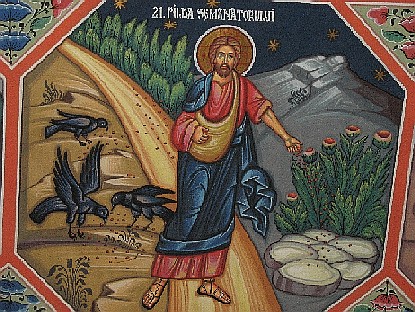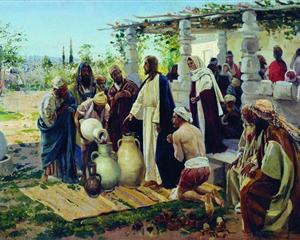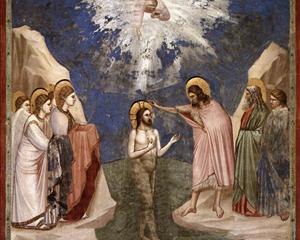This guest post was writtten by Brandon Rappuhn, Marketing Copywriter at Faithlife.
“This is the time of fulfillment. The kingdom of God is at hand. Repent, and believe in the gospel” (St. Mark 1:15).
The proclamation of the Kingdom of God is a mystery broad and deep, inviting us to meditate on any of Jesus’ teachings, his mission, and/or the teachings of the Church. But for today’s meditation, I’d like to dwell on the fourth chapter of St. Mark and what Jesus has to say about his parables.
They May Not be Converted and Forgiven
Jesus says,
“The mystery of the kingdom of God has been granted to you [the disciples]. But to those outside everything comes in parables, so that
‘they may look and see but not perceive,
and hear and listen but not understand,
in order that they may not be converted and be forgiven’” (Mk 4:11-12).
This is a striking passage. Would Jesus intentionally muddy his teachings to confuse people? Would he do such a thing to keep people from being converted, and from being forgiven?
At first glance, Jesus’ statement might appear malicious and ruthless—not at all like the gentle and forgiving Jesus to whom we pray our Divine Mercy chaplets. But reading further invites conversation with the Word concerning this very difficult passage. Jesus then indicates that he knows the parables might confuse people:
Jesus said to them, “Do you not understand this parable? Then how will you understand any of the parables?” (Mk 4:13).
Immediately, we can see that even the disciples misunderstand the parable of the sower, given a few verses earlier:

Listen! A sower went out to sow. 4 And as he sowed, some seed fell along the path, and the birds came and devoured it. 5 Other seed fell on rocky ground, where it had not much soil, and immediately it sprang up, since it had no depth of soil; 6 and when the sun rose it was scorched, and since it had no root it withered away. 7 Other seed fell among thorns and the thorns grew up and choked it, and it yielded no grain. 8 And other seeds fell into good soil and brought forth grain, growing up and increasing and yielding thirtyfold and sixtyfold and a hundredfold” (Mk 4:3-8).
The Parable of the Sower Explained
Jesus’ explanation helps us understand his statement about those who “hear and listen but do not understand.” In the parable the sower sows seed on 4 different types of soil, but the seed only takes root in only one type of soil. The other soil types refused to support the plant the seed was meant to become
The sower sows the word—the Word of God, the Gospel, the proclamation of the Kingdom. This could possibly even extend to the Sacraments. Consider the reasons why the Word did not take root and survive as a plant. And the word sown on rich soil represents those who hear the word, accept it, and bear fruit 30, 60, even 100-fold.
Many who would read this passage might initially think that the state of the soil represents the state of a person’s heart and mind before deciding whether or not to become Catholic (or Christian). But we see all around us that the Word of God is being sown upon us all the time—through the daily Gospel readings, through daily Mass, through our fellow Catholics, even through this very blog post you are reading. The state of the soil in the parable, I believe, represents our daily receptivity to the Word of God being sown into us.
Whoever Has Ears to Hear Ought to Hear
Thus, this parable answers the paradox presented by Jesus’ statement that “some may hear and not understand.” If we have good soil, and are receptive to the Word of God, we might see and perceive the teachings of Christ, and thus be converted and forgiven. But what do we do to have our soil receptive to the Word?
We get out our spades, shovels, hoes, and till the soil. This is where our good Catholic disciplines come into practice. Fasting on Fridays, praying the rosary, and performing the penance we’re given after a good confession—these are the things that create a good soil for God’s Word to be sown upon. We can even assign ourselves little penances to prepare our hearts to receive God (St. Francis de Sales taught me this). Penance prepares us to receive Christ again in the future, and when Christ calls upon us once more, we’ll have to decide again whether we’ll refuse to let the seed take root and bear fruit—or listen and let it grow in us.




